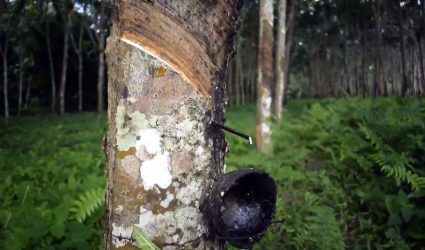Thailand: Cabinet agrees to slash rubber plantations, ramp up value of exports

(Bangkok Post) – The cabinet has approved a 20-year plan to slash rubber plantations by 21% nationwide and increase the value of rubber exports by more than threefold, a government spokeswoman said on Wednesday.
Thailand is the world’s top producer and exporter of natural rubber, accounting for up to 40% of global supply, but the kingdom’s rubber farmers have struggled with low prices in recent years in line with a decline in global demand.
To prop up prices and stabilise farmers’ incomes, the government has outlined a set of targets to achieve by the year 2036, said deputy government spokeswoman Rachada Dhnadirek.
The targets include reducing rubber plantations by 21%, from 23.3 million rai (3.73 million hectares) in 2016 to 18.4 million rai (2.94 million hectares), and increasing the value of exports of natural rubber or rubber products from 250 billion baht to 800 billion baht per year.
The government also wanted to raise average yield per rai by 60% and average income per rai by 65%, and increase domestic rubber consumption to 35% from 13.6% of total rubber production each year.
The country has been significantly stepping up efforts to export rubber in recent months after it cut exports for four months from late May to late September, as part of a scheme by the world’s top exporters to prop up global prices.
The push came as Thai exports were hit by global trade tensions, and the strength of the baht – Asia’s top performing currency this year – has further put pressure on the trade-reliant economy.
Last week, commerce minister Jurin Laksanawisit said Thailand had signed recent rubber export deals worth 34 billion baht ($1.13 billion).
That also included deals to sell 140,000 tonnes of rubber products, worth 8.07 billion baht, signed during a three-day rubber expo in Bangkok last week, he said.

